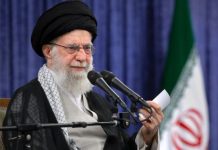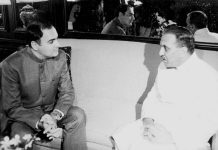Qamar Bashir
In today’s press conference by DG ISPR, Lt. Gen. Ahmed Sharif Chaudhry, a notable shift was observed compared to previous briefings. For the first time in several press conferences, the focus on the “May 9 riots” previously emphasized with severity, aggression, and strong warnings about consequences—was noticeably subdued. The tone concerning Balochistan was conciliatory, as the DG ISPR referred to the province as the “Shaan, Aan, and Jaan” of Pakistan. He praised the people of Balochistan as among the most intelligent, honorable, and brave in Pakistan, marking a significant departure from earlier rhetoric focused on security concerns.
Additionally, the stance toward Afghanistan was notably softened. While maintaining a firm stance on ensuring no third power disrupts the relationship, the language was more diplomatic, emphasizing the need to preserve the “friendly and brotherly relations” between the two nations.
However, for the media consumption, the most important part of the Press Conference was his reply to question whether the army would take custody of Mr. Imran Khan tried him under the military act in connection with the court-martial proceedings of the former DG ISPR. His reply is going to reverberate in the media for quite some time. He termed the question hypothetical but added that the law would be applied without discrimination if any individual, including those with political influence, were found to have violated it. The DG emphasized in such matters the law would take its own course.
Let us consider a hypothetical scenario that Mr. Imran Khan is tried under the military act on charges of conspiring to use or influence a former Director General of the ISI (DG ISI) for personal or political gain. The political implications could be profound for both his personal future and Pakistan’s political landscape.
One possibility is that the trial under the military act may severely damage Imran Khan’s standing, both within Pakistan and internationally. Historically, political leaders facing charges related to military matters or allegations of compromising national security have seen their influence wane. In Imran Khan’s case, if proven guilty of such serious charges, he could be disqualified from holding public office, similar to how leaders in Pakistan’s past, like Nawaz Sharif, have faced legal hurdles that led to political marginalization. This would drastically reduce his capacity to participate in upcoming elections or hold any political office.
Trying a former prime minister under the military act could set a significant legal precedent in Pakistan, highlighting the military’s continued influence in political matters. This could lead to heightened tensions between political forces and the military, as well as sparking debates over civil-military relations. Additionally, such a move might further polarize the political environment, rallying Imran Khan’s supporters to protest perceived injustices while his opponents capitalize on the situation.
If Imran Khan were convicted, this would set a dangerous precedent on one hand and on the other hand it would impact PTI, his political party. His leadership is central to the party’s identity, and his removal from the political scene would create a power vacuum within PTI, possibly fracturing the party. Without Khan’s charismatic leadership, PTI could struggle to maintain its voter base, opening the door for rival parties like the PML-N and PPP to consolidate their positions.
Imran Khan’s trial could also fuel public sympathy or resistance. If his supporters perceive the charges as politically motivated or part of a larger effort to suppress dissent, it could lead to increased public unrest and protests, exacerbating political instability. Conversely, if the charges are viewed as legitimate and linked to national security, it could weaken his popular appeal and erode his support base.
Internationally, such a trial could lead to diplomatic challenges. Western countries and international organizations could scrutinize Pakistan’s legal and political processes, questioning the fairness of the trial. It could also impact Pakistan’s relationships with key allies, especially if the case is perceived as part of internal power struggles.
Over the next decade, this scenario could lead to new political movements filling the void, while the electoral landscape may focus on Khan’s legacy. The trial’s handling will also reflect on Pakistan’s democratic institutions, potentially strengthening or weakening trust in governance depending on its fairness and transparency. It would further enlarge the wedge between the army and the general public comprising national security.
In the worst case scenario, Imran Khan’s arrest would have profound implications across several fronts. It could trigger widespread protests from his supporters, escalating violence and straining the security forces, leading to clashes and disrupting daily life in major cities. The law and order situation could deteriorate further as political polarization increases, with potential for clashes between rival factions. Economically, the unrest could harm investor confidence, cause currency depreciation, and exacerbate inflation. Disruptions in markets and businesses could stall economic activity, further weakening Pakistan’s fragile financial position, especially in ongoing negotiations with international lenders like the IMF. Overall, the arrest would intensify political instability, complicating Pakistan’s internal governance and international standing.
Finally, if the Supreme Court declares an arrest illegal, especially in a high-profile case like that of Imran Khan, it would have far-reaching implications. Legally, it would reaffirm judicial independence and set a precedent for upholding civil liberties, possibly leading to the individual’s release and accountability for those responsible for the unlawful detention. Politically, it could boost the individual’s popularity, presenting them as a victim of injustice and strengthening their position, while weakening the government or authorities that initiated the arrest. This ruling could also strain civil-military relations if military involvement is questioned. In terms of law and order, the decision could either calm or incite public unrest depending on how various groups perceive it. On the international front, it would enhance Pakistan’s image as a country that upholds the rule of law, reassuring investors and foreign governments about the strength of its democratic institutions.
Any action taken by the army against Imran Khan must be weighed carefully, as it could have serious implications for political stability and public order. A hasty or disproportionate response could lead to major setbacks for the country’s internal security, governance, and international standing.
Qamar Bashir
Former Press Secretary to the President
Former Press Minister to the Embassy of Pakistan to France
Former MD, SRBC, CEO, ATV

















